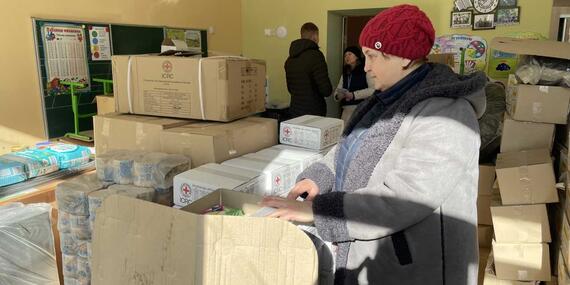Today's top news: Türkiye and Syria, Ukraine

Türkiye- Syria
The UN continues to mobilize emergency teams and relief operations. Some 130 teams comprising those certified by the UN’s International Search and Rescue Advisory Group and other international urban search and rescue (USAR) Teams consisting of 7,716 search and rescue personnel, supported by 222 search dogs have deployed. They are working in the earthquake-affected area of Türkiye in the provinces of Malatya, Kahramanmaraş, Adiyaman, Gaziantep, Hatay, and Osmaniye. Another 57 International USAR Teams are on their way.
At the Government’s request, two United Nations Disaster Assessment and Coordination (UNDAC) teams with a total of 50 members have been deployed to Gaziantep and to four hubs in the affected area to support the coordination of USAR Operations. A separate UNDAC team has arrived in Syria and is deploying to Aleppo, Homs and Latakia to support the response there.
The UN is working to rapidly scale up its assistance, including through the cross-border aid operations, as humanitarian needs are overwhelming in the aftermath of the earthquakes. In Syria, humanitarian organizations are supporting immediate response efforts, including, provision of food; non-food items, portable water, medicines, first aid and trauma care, dignity kits and protection interventions.
Today, the second UN aid convoy since the earthquakes struck on 6 February crossed Bab Al Hawa to north-west Syria. The convoy was comprised of 14 trucks loaded with aid provided by the International Organization for Migration. Millions of Syrians depend on UN cross-border assistance enabled by the Security Council. The majority are women and children. The operation was temporarily disrupted for three days when roads were damaged by the earthquakes. It resumed yesterday.
OCHA USG in Türkiye
Meanwhile Under-Secretary-General for Humanitarian Affairs and Emergency Relief Coordinator Martin Griffiths is in Ankara today and had separate meetings with Vice President Fuat Oktay and Minister of Foreign Affairs Mevlüt Çavuşoğlu.
The discussion focused on the earthquake response and the Black Sea Grain Initiative. Mr. Griffiths affirmed UN’s support for Türkiye’s efforts following the devastating earthquake.
Mr. Griffiths also visited Turkish disaster management agency, AFAD’s National Disaster Management Operations Centre where representatives of the Turkish Government, national and international NGOs, UN, EU and others are based to support the Government’s coordination and response efforts. The UN Disaster Assessment and Coordination Team and European Union Coordination Cell are also embedded within the centre to strengthen coordination and support AFAD. Mr. Griffiths also met with the head of AFAD, Governor Yunus Sezer.
Ukraine
Another massive attack across the country has resulted in several civilian casualties and damaged energy and other infrastructure, interrupting basic services amidst freezing temperatures.
In Kharkiv alone, some 150,000 customers — households and businesses — have no electricity, according to the local authorities. Electricity supplies and heating were also disrupted in Zaporizhzhia in the south-east. The city suffered one of the most intensive attacks, which damaged energy infrastructure and other premises, according to the city administration.
Furthermore, the private operator of coal-fired power plants located in different regions reported that two of its employees were injured while on duty today. In 2022, as many as 100 energy workers were killed while working and twice as many were injured, according to the Government.
On the humanitarian response side, today, we sent another inter-agency convoy with humanitarian aid to Ocheretyne, a community in the Donetsk region, which is 18 km from the front line to provide medical supplies to treat all those who remain behind. We also provided solar lamps, hygiene kits and bedding and other supplies.
About 3,600 people including some 200 children have stayed behind in Ocheretyne, which used to have over 23,000 people before the war, including 6,000 who had been previously uprooted by the conflict in eastern Ukraine, according to our colleagues on the ground. Almost 20,000 of them have been forced to flee.
The people in the area have had no gas supplies since February 2022, and access to water and electricity, as in many parts of Ukraine, is unstable. The lack of transport is affecting access to health services. These are other small communities in similar conditions– some of them are now under the military control of the Russian Federation. Some of the villages do not have health services.
Local authorities are making every effort to support them and today OCHA facilitated the delivery of supplies from the International Organization of Migration, the Office of the High Commissioner for Refugees, UNICEF and the World Health Organization, to be distributed among the residents.
